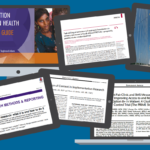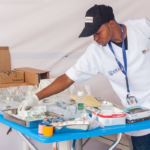The time has finally arrived for the annual conference of the Triangle Global Health Consortium. Global health enthusiasts in North Carolina’s research triangle area look forward to this week all year. This year’s conference takes place at North Carolina State University centered around a theme of innovation and positive global health impact.
The Consortium is a partnership of academic members, like Duke University and The University of North Carolina at Chapel Hill, corporate members, faith-based organizations, and non-profit organizations, like RTI International and FHI 360. The members aim to innovate “through collaboration to improve the health of the world’s communities” using research, education and advocacy.
As proud members of the Consortium, FHI 360 staff are participating throughout this week’s annual conference – notably, in four different panel and workshop discussions on unmanned aerial vehicles (drones), digital health, co-design for ideation, and accelerating innovation through scale-up. Additionally, Dr. Tim Mastro, FHI 360’s Chief Science Officer, presents a keynote address focused on global health innovations that have shaped and will shape the world.
In recognition of Mastro’s keynote address, and what will surely be another engaging annual conference, I want to take a quick trip down memory lane and revisit three of his past R&E Search for Evidence blog posts that focus on global health innovation.
First, I want to highlight a recent blog post titled, “Cultivating HIV scientists for Africa: The INTEREST Conference, Kigali, Rwanda.” Mastro says that to control the HIV epidemic in Africa we must have innovative solutions generated and implemented locally on the continent. He uses the annual INTEREST Conference as an example of global efforts to cultivate African scientists and stimulate innovation. The post highlights several of the conference’s dynamic presentations (which are worth taking a look at), as well as the conference’s focus on implementation science and efforts to achieve global HIV targets.
Second, it’s all about the data – or the effective use of data as a means to improve the impact of global health programs. Since PEPFAR, the world’s largest investment in disease control, has transitioned from an emergency response to an epidemiological response based on real-time data, Mastro asks “Should PEPFAR be renamed the President’s Epidemiologic Plan for AIDS Relief?” in a past blog post. He rightfully observes that this transition to real-time accessible data has set a “new global standard” for achieving HIV epidemic control. He notes this use of data can assure accountability, improve transparency and ultimately improve impact across global health programs.
Third, in one of my favorite quotes from Mastro, he says that this is “a most exciting time to be a data geek!” Why would he say that? The easy answer is “…there’s an app for that,” which comes from a recent blog post about 20 years of advances in global health data. The Global Burden of Disease, Injury and Risk Factor Study (GBD) is the center of the post. The GBD tracks 333 diseases and injuries, 774 geographies, and 84 risk factors for disease across decades. This enormous data set is now housed at the Institute for Health Metrics and Evaluation (IHME) at the University of Washington, where it has been made accessible online and via a new mobile phone app. Mastro notes that innovations facilitating access to high-quality data, like this app, can improve decision making and reduce the burden of disease.
I hope that you find the above posts on global health innovation relevant to the timely conversations taking place at the Triangle Global Health annual conference this week. Our team looks forward to another year of engaging and thoughtful discussions with our Consortium partners.
Photo credit: FHI 360



